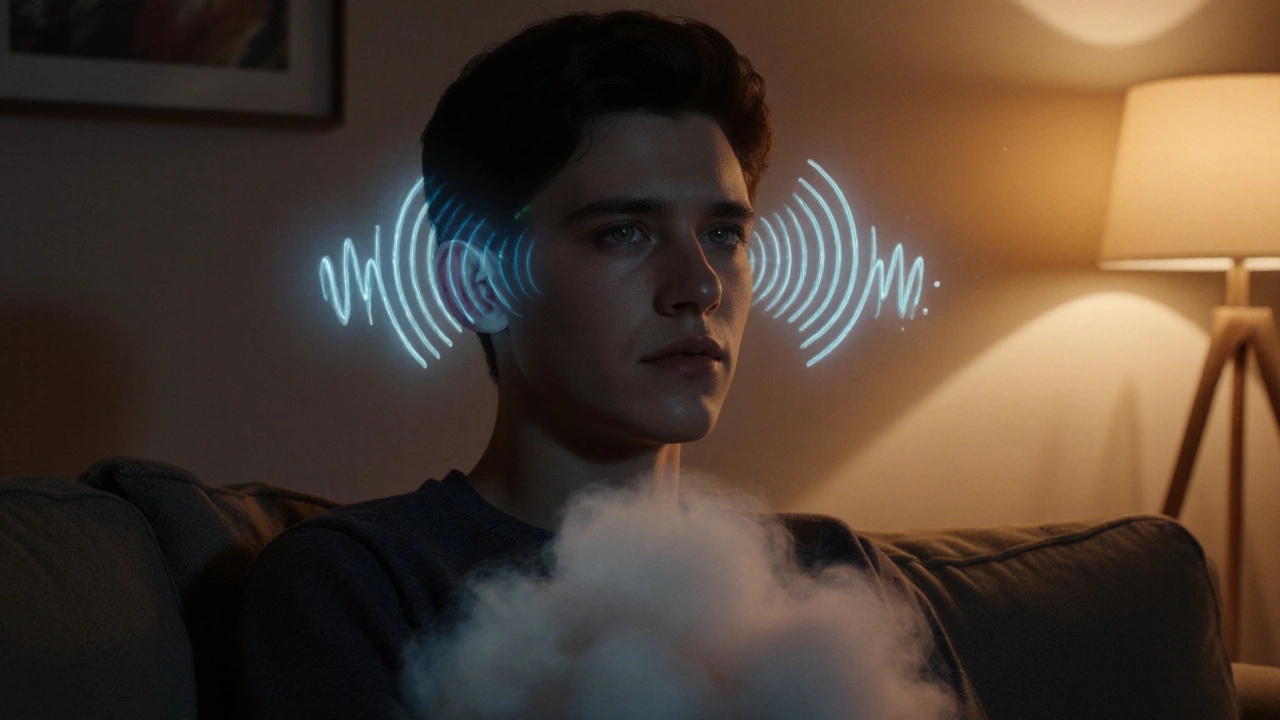Living with a constant ringing, buzzing, or hissing in your ears can feel like an invisible weight that never lifts. That weight often turns into tinnitus and mental health challenges, affecting everything from mood to sleep. Below you’ll discover how the two are linked, warning signs to watch for, and practical steps you can take to protect your mental wellbeing.
Key Takeaways
- Tinnitus triggers anxiety, depression, stress, and sleep problems in up to 60% of sufferers.
- Early recognition of mental‑health symptoms can prevent chronic issues.
- Evidence‑based strategies such as CBT, sound enrichment, and lifestyle tweaks reduce distress.
- Professional help is crucial when symptoms interfere with daily functioning.
- Support groups and reputable resources provide ongoing encouragement.
Understanding the Mind‑Body Link
Tinnitus is a perception of sound without an external source, often heard as ringing, buzzing, or whistling. While many view it as a purely auditory issue, research shows it sparks a cascade of emotional and cognitive responses that can compromise mental health.
When the brain constantly processes phantom sounds, it can enter a state of hyper‑arousal. This heightened alertness fuels worry, irritability, and the feeling that you can’t escape the noise-conditions that set the stage for anxiety, depression, and chronic stress.
Common Mental‑Health Effects
Below is a quick snapshot of how tinnitus manifests across the mental‑health spectrum.
| Effect | Typical Signs | Evidence‑Based Management |
|---|---|---|
| Anxiety | Restlessness, racing thoughts, avoidance of quiet places | CBT, relaxation training, low‑dose anxiolytics (under doctor guidance) |
| Depression | Low mood, loss of interest, feelings of hopelessness | Psychotherapy, antidepressants, activity scheduling |
| Stress | Muscle tension, irritability, blood‑pressure spikes | Mindfulness, progressive muscle relaxation, regular exercise |
| Sleep Disturbance | Difficulty falling asleep, frequent awakenings, non‑restorative sleep | Sound enrichment, sleep hygiene, CBT‑I (insomnia) |
| Cognitive Impact | Difficulty concentrating, memory lapses, mental fatigue | Pacing tasks, mental‑training apps, adequate rest |

Deep Dive: How Each Symptom Shows Up
Anxiety is a state of excessive worry and physiological tension that interferes with daily activities. For tinnitus patients, anxiety often spikes in quiet environments where the phantom sound becomes louder relative to background noise. The brain interprets this as a threat, triggering the fight‑or‑flight response.
Depression is a persistent low mood, loss of interest, and reduced energy that lasts at least two weeks. The endless buzz can erode motivation, making hobbies feel pointless and social interaction draining.
Stress refers to the body’s reaction to perceived challenges, leading to hormonal and physical changes. Over time, chronic stress can worsen tinnitus perception, creating a vicious loop.
Sleep Disturbance describes any difficulty in initiating or maintaining sleep, resulting in non‑restorative rest. The silence of night magnifies tinnitus, leading to insomnia or fragmented sleep.
Cognitive Function encompasses attention, memory, and executive processes that enable everyday problem‑solving. Studies show that persistent tinnitus can reduce performance on attention‑driven tasks, especially when the brain is fatigued.
Spotting Warning Signs Early
Being able to differentiate normal tinnitus fatigue from a mental‑health crisis is crucial. Look out for any of the following patterns persisting for more than two weeks:
- Intense worry about the sound that interferes with work or relationships.
- Feelings of hopelessness or thoughts that the tinnitus will never improve.
- Physical agitation-muscle tension, rapid heartbeat, or sweaty palms-when the noise is prominent.
- Repeatedly waking up at night because the ringing feels louder.
- Forgetfulness or difficulty concentrating on simple tasks.
If any of these symptoms dominate your day, it’s time to seek help.
Practical Coping Strategies
Below are evidence‑backed tactics you can start using today.
1. Sound Enrichment
Adding low‑level background noise (white noise machines, nature sounds, or soft music) can mask the tinnitus and reduce the brain’s focus on it. Aim for a sound level that’s just below the perceived ringing.
2. Cognitive Behavioral Therapy (CBT)
Cognitive Behavioral Therapy is a structured psychotherapy that helps reframe negative thought patterns and develop coping skills. CBT for tinnitus teaches you to challenge catastrophic thoughts (“I’ll never be able to concentrate”) and replace them with realistic reflections.
3. Mindfulness and Relaxation
Practices like guided meditation, deep‑breathing exercises, and progressive muscle relaxation lower the body’s stress hormones, making the tinnitus feel less intrusive. Even five minutes a day can shift the brain’s response.
4. Healthy Lifestyle Habits
- Exercise: Regular aerobic activity boosts endorphins, which improve mood and can lessen perceived loudness.
- Diet: Limit caffeine and alcohol, as they can aggravate both tinnitus and anxiety.
- Hydration: Dehydration can affect inner‑ear fluid balance, possibly intensifying symptoms.
5. Sleep Hygiene
Establish a consistent bedtime routine, keep the bedroom cool, and avoid screens an hour before sleep. If silence magnifies tinnitus, use a fan or a low‑volume nature soundtrack to create a soothing backdrop.
6. Professional Auditory Care
Consult an audiologist who can evaluate hearing loss, offer hearing‑aid solutions, or prescribe customized sound‑masking devices.

When to Seek Professional Help
If you notice any of the following, schedule an appointment promptly:
- Persistent depressive mood lasting more than two weeks.
- Severe anxiety that leads to panic attacks or avoidance of everyday situations.
- Insomnia that leaves you feeling exhausted day after day.
- Thoughts of self‑harm or hopelessness.
- Sudden changes in tinnitus intensity accompanied by ear pain, dizziness, or hearing loss-these could signal an underlying medical issue.
Primary care physicians can refer you to mental‑health specialists, while ENT doctors or audiologists address the auditory side. Integrated care-where both domains work together-produces the best outcomes.
Resources and Community Support
Connecting with others who share your experience reduces isolation. Here are reputable avenues:
- Tinnitus Association: Offers educational webinars and local support groups.
- Mind (Australia): Provides free mental‑health counseling and crisis lines.
- National Health Service (UK) Tinnitus Hub: Features patient stories and coping toolkits (useful even for Aussie readers).
- Online Forums: Reddit’s r/tinnitus, HearingHealth forums - read, share, and ask questions.
Remember, while tinnitus is a chronic condition for many, its mental‑health impact is often manageable with the right strategies and support.
Frequently Asked Questions
Can tinnitus cause depression?
Yes. Persistent ringing can lead to feelings of hopelessness, especially when it interferes with sleep and social activities. Studies show up to 45% of chronic tinnitus sufferers report depressive symptoms.
Is there a medication that stops tinnitus?
No drug universally eliminates tinnitus. Some doctors prescribe low‑dose antidepressants or anti‑anxiety meds to relieve the associated distress, but they don’t cure the sound itself.
How long does it take for CBT to help?
Typically 8‑12 weekly sessions show measurable reductions in anxiety and tinnitus‑related distress. Benefits often continue to grow after therapy ends.
Can exercise really reduce tinnitus annoyance?
Regular aerobic exercise releases endorphins, which improve mood and can lower the perceived loudness of tinnitus. Even a 30‑minute walk most days has shown positive effects.
Is sound‑masking safe to use every night?
Yes, as long as the volume stays below the level of the tinnitus and you avoid ear‑bud devices that sit directly in the canal for long periods. Many users find a bedside fan or white‑noise app effective.

Gary Levy
I’ve found that incorporating a low‑level white noise machine before bedtime can really soften the ringing and make it easier to drift off. Even a fan or a simple app on your phone works if you keep the volume just below the perceived buzz. Pair that with a short breathing exercise and you’ll notice a calmer mind within minutes.
It’s a small habit, but consistency is key.
sourabh kumar
the thing about tinnitus is that you keep hearing that sound and you start to think it’s the end of the world and you ignore all other stuff that could help you and that’s when the anxiety really kicks in
Christian Miller
In a world where pharmaceutical companies profit from perpetual distress, it is unsurprising that the mainstream narrative emphasizes medication over holistic strategies. One must remain vigilant about the incentives that drive such recommendations.
NORMAND TRUDEL-HACHÉ
Honestly, the advice about sound enrichment is elementary, but it’s effective. Most people overlook simple background noise and think a miracle cure is coming. Keep it low, keep it steady, and the brain stops obsessing.
AJIT SHARMA
People need to understand that coping with tinnitus isn’t just about listening to soothing sounds; it’s about moral responsibility to our health. If you ignore the signs, you’re essentially betraying your own well‑being. It’s a simple truth.
Neber Laura
Sounds like a lot of fluff the way most sites throw around CBT and mindfulness-sure, it helps, but don’t think it’s a cure‑all for every case.
Karen Nirupa
It is noteworthy, in a cross‑cultural context, how many individuals rely on community support when confronting persistent auditory phenomena. By engaging with local groups, one may find both solace and practical strategies that align with broader mental‑health paradigms.
Quinn Comprosky
I’ve been living with tinnitus for several years, and the journey toward mental‑health stability has been a mosaic of small adjustments and persistent practice. First, I introduced a gentle, ambient soundscape during the night; a simple fan or a looping stream track at a barely audible level can dampen the perceived volume of the ringing. Second, I committed to a daily mindfulness routine-just five minutes of guided breathing, focusing on the rise and fall of each inhale, which gradually reduced the hyper‑arousal response that the brain often exhibits. Third, regular aerobic exercise, such as brisk walking or light jogging, released endorphins that lifted my mood and, interestingly, seemed to dull the intensity of the phantom sound. Fourth, I consulted a cognitive‑behavioral therapist who helped reframe catastrophic thoughts, replacing "I’ll never be able to concentrate" with "The ringing is present, but it does not define my capabilities." Over time, I learned to schedule intellectually demanding tasks during periods when the tinnitus was less intrusive, usually in the mid‑morning after a short walk. Additionally, I adopted sleep hygiene practices: a consistent bedtime, a cool dark room, and the strategic use of a low‑volume nature soundtrack to prevent the silence of night from amplifying the noise. I also experimented with dietary tweaks-cutting back on caffeine and alcohol, staying well‑hydrated, and ensuring a balanced intake of omega‑3 rich foods, which seemed to support overall auditory health. On days when stress spikes, I lean on progressive muscle relaxation, tensing and releasing each muscle group, which helps lower overall tension and, by extension, the tinnitus perception. Importantly, I keep an open line of communication with my audiologist, who adjusted my hearing aid settings to incorporate gentle masking, providing further relief. The cumulative effect of these steps is not a miracle cure, but a significant reduction in distress, better sleep quality, and a more resilient mindset. I share this because many people feel isolated by the constant ringing, and knowing that a toolbox of practical, evidence‑based strategies exists can be empowering.
Tiffany Owen-Ray
When you treat tinnitus as a part of your daily routine rather than a mysterious curse, you open the door to realistic coping. A short walk, mindful breathing, and a gentle hum in the background can shift the narrative from "I’m trapped" to "I’m managing".
Ellie Chung
Wow, the buzzing really does feel like a tiny DJ party in my ears.
Sophia Simone
While the preceding suggestions are well‑intentioned, one must critically assess the empirical support behind each recommendation. Not all sound‑masking devices are created equal, and indiscriminate use may inadvertently heighten auditory sensitivity. It would be prudent to consult a certified audiologist before committing resources.
Juan Sarmiento
Hey, I’ve been on the same struggle and found that a short 5‑minute meditation right after lunch can really quiet the mind and, in turn, the ring. Keep at it, and you’ll notice the anxiety easing.
Patrick McVicker
Great advice! 👍 I’ve tried the fan trick and it works wonders. Also, a quick stretch before bed helps my neck and reduces the ringing.
Liliana Phera
Let’s be clear: ignoring the mental toll of tinnitus is a recipe for deeper despair. It’s not just a nuisance; it’s a genuine psychological burden that demands proactive coping.